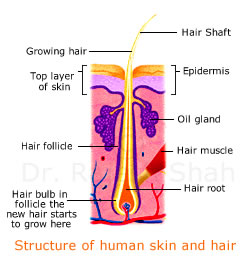Life Science Demo
Contents
Overview
Alopecia areata (‘baldness in spots') is a form of hair loss, usually from the scalp, although it can affect other areas of the body. The hair loss mostly remains limited to the scalp but in certain cases it can extend to eyebrows, eyelashes, facial hair (beard, moustache), nasal hair and give rise to bald spots anywhere in the body.
Alopecia can affect both men and women and it is not uncommon to see children affected with this disorder. Approximately 2% of the general population worldwide suffers from alopecia areata.
Understanding alopecia areata: The hair is made up of a protein called keratin which is also the main constituent of nails. A specialised structure inside the skin called ‘Papilla' produces the hair as shown in the figure. The papilla is surrounded by a sac-like structure called the ‘Hair follicle' which also surrounds rest of the hair root within the skin. The part of the hair outside the skin surface is called as shaft. Source
